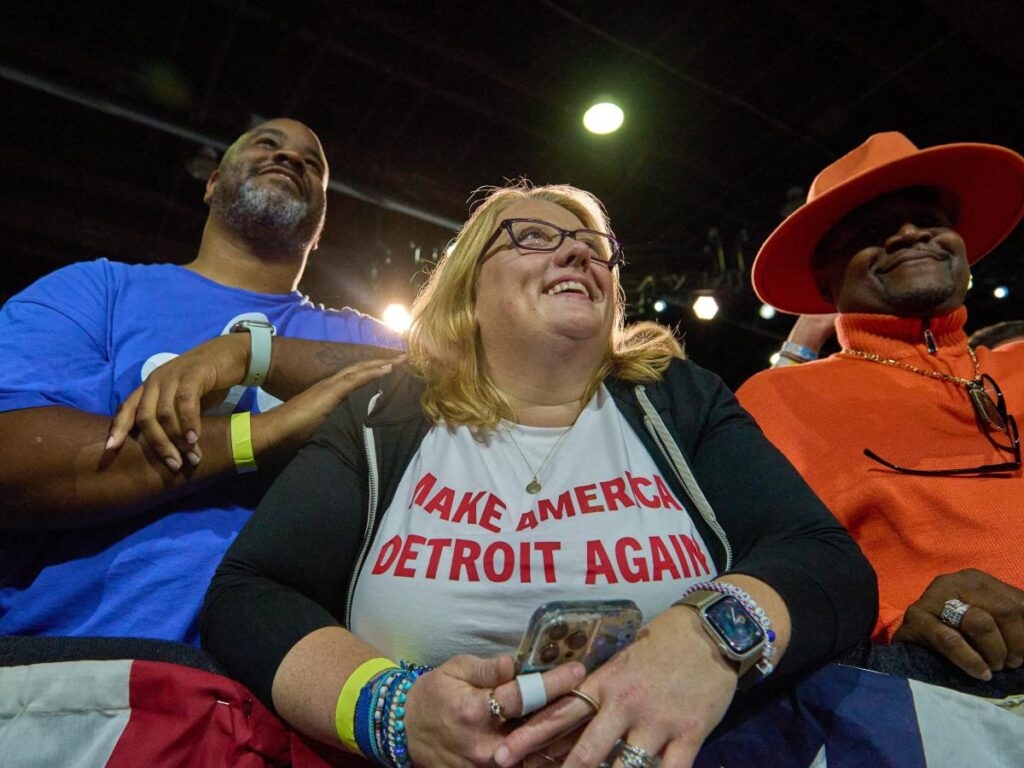As the election approaches, Michigan is emerging as a critical battleground state, with polls indicating a tight race between the candidates. Key political figures like Lieutenant Governor Garlin Gilchrist II, who is campaigning for Kamala Harris in partnership with Minnesota Governor Tim Walz, and Mark Forton, the Macomb County GOP Chair supporting Donald Trump, are actively reaching out to the influential union voter base. Historically, union members have leaned Democratic, but their allegiance appears to be shifting this cycle due to various pressing issues, particularly high prices and economic concerns. Both Gilchrist and Forton emphasize the crucial role union workers have played in determining election outcomes in Michigan, underlining that this upcoming election is likely to be just as competitive as past years.
In Macomb County, pivotal in Trump’s 2016 victory and Biden’s 2020 comeback, the sentiments among working-class voters are increasingly leaning rightward. Forton is optimistic about the Republican Party’s prospects in this traditionally Democratic stronghold, where he is actively engaging with voters door-to-door. He asserts that many local residents are reevaluating their political affiliations, driven by economic hardships rather than longstanding party loyalty. In contrast, Gilchrist highlights the rising distress among union workers concerning economic stability, particularly given ongoing layoffs and plant closures. The representatives underscore that voters are looking for candidates who not only promise economic recovery but also instill a sense of trust.
An important factor contributing to the electoral dynamics in Michigan is the changing allegiances within unions, such as the powerful Teamsters. This year, the Teamsters have notably refrained from endorsing a Democrat for the first time since 1996, which reflects a significant shift in the political landscape. Poll data reveals a notable increase in Trump’s support among union voters, suggesting that traditional voting patterns may be altering substantially. This trend parallels a national shift wherein working-class Americans are increasingly gravitating towards Republican candidates, indicating a broader realignment of the electoral map at a moment when Michigan’s union membership could play a decisive role.
While Gilchrist remains hopeful about union support for the Harris campaign, he acknowledges the complexity of the situation. Labor unions, traditionally staunch defenders of Democratic candidates, are not a monolithic voting block. They consist of members from various political backgrounds, making it essential for candidates to connect with voters on pertinent issues. Forton, reflecting on his own experiences as a former UAW member, shares narratives from fellow union workers who express discontent with leadership decisions and a strong preference for Trump. The conversations among workers highlight a desire for economic security, prompting them to engage with political choices that resonate more closely with their immediate challenges.
Amid the ongoing economic pressures, inflation continues to strain working families, who are disillusioned by what they perceive as ineffective economic policies. Voters are experiencing firsthand the impact of rising costs on their everyday lives, leading to heightened skepticism towards current leadership. Both Forton and Gilchrist note that constituents are acutely aware of the discrepancies between political messaging and their lived realities. In this context, the candidates recognize the need to present practical solutions that address economic challenges while fostering a genuine connection with the electorate to build trust.
Ultimately, the Michigan election cycle is shaping up to be a crucial contest, with union votes likely influencing the outcome significantly. As both Gilchrist and Forton work to mobilize support, they are keenly aware of the stakes involved for working-class families. They each represent distinctive perspectives that highlight the diverse needs and aspirations of voters in Michigan. As sentiments shift and economic anxieties persist, the political implications could reverberate beyond state lines, making Michigan a focal point of national attention as the 2024 election approaches.

